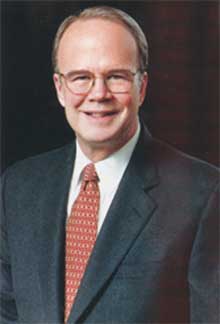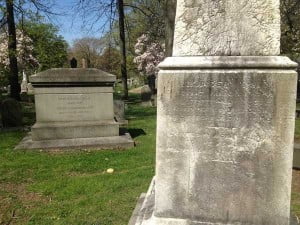The Rev. Samuel G. Craig, founder of Presbyterian & Reformed Publishing, was one of those conservatives who stayed in the Presbyterian Church in the U.S.A., continuing to fight for an orthodox Christian faith. Dr. Clarence E.N. Macartney, whom Craig mentions toward the end of this editorial, was another of those who stayed to continue the difficult fight. Dr. Craig wrote this editorial not many months after the formation of the Orthodox Presbyterian Church [initially named The Presbyterian Church of America]. The editorial is his explanation of why he stayed. It may also offer some insight into the thinking of those who, to this day, continue to stay to fight for the Gospel of Jesus Christ and against modernism and unbelief. By God’s grace, He has put us in other places, but these brothers and sisters do deserve our prayers and encouragement.
THE ALLEGED APOSTASY OF THE PRESBYTERIAN CHURCH U.S.A.
[excerpted from Christianity Today 7.6 (October 1936): 1-2.]
APOLOGISTS for the “Presbyterian Church of America” justify its formation on the ground that the Presbyterian Church in the U.S.A. has become apostate. It would even seem that most of their members hold that all the Presbyterian churches of America that existed prior to June 11, 1936, have become Presbyterian churches in name only, as otherwise it is natural to assume, especially in view of their small number, that they would have sought membership in one of the already existing Presbyterian Churches. Be that as it may, they unblushingly affirm that the Presbyterian Church in the U.S.A. is hopelessly corrupt and that it is a sin to remain a member of said Church.
The above charge seems so incredible on its face as to call for no consideration. However, in view of the fact that it is being persistently made by the organizers and promoters of the newly organized “Presbyterian Church of America,” it may not be out of place to make brief reference to it.
It should not be overlooked, in the first place, that it is as impossible to indict a whole Church as it is to indict a whole nation (Burke). Even if we should grant the contention that the existing leadership of the Presbyterian Church in the U.S.A. is apostate—we think even that a gross exaggeration—it would by no means follow that the Church as a whole with its nearly ten thousand ministers, some fifty thousand elders and approximately two million members is apostate. The charge is so absurd that it is passing strange that persons, otherwise seemingly sane and sober, should give it any credence.
It should be noted, in the next place, that this charge is based largely if not exclusively on the judicial decisions of the last Assembly. Certainly previous to the judicial decisions of the last Assembly the charge could not well be made by those now members of the “Presbyterian Church of America” as practically all of them were at that time members of the Presbyterian Church in the U.S.A. It is important to point out, therefore, that even if it were true that the last Assembly sitting as a court handed down decisions that involved placing the word of man above the Word of God and subordinating Christ himself to a human authority that would not mean that the Presbyterian Church had become officially apostate. To judge thus is grossly to overestimate the significance that attaches to judicial decisions according to Presbyterian law. The doctrine of stare decisis is not a part of the law of the Presbyterian Church in the U.S.A. This means that while decisions by a General Assembly, sitting as a court, are final as far as the cases before it are concerned yet that these decisions do not establish binding precedents. It is impossible, therefore, for the Presbyterian Church to become apostate through the actions of a single Assembly Avithout the concurrence of the presbyteries. No doubt if a succession of Assemblies, with the approval of the Church at large, should take actions that in effect acknowledged a king other than Christ and placed the stamp of its approval on “another gospel” that would, for all practical purposes, have the same effect as if this had been done by an Assembly with the concurrence of the presbyteries. But as yet at least that has not happened.
It should be noted further that such plausibility as attaches to the allegation that the Presbyterian Church in the U.S.A. apostasized through the actions of the last Assembly is derived for the most part from, the assumption that said Assembly placed the seal of its judicial approval on the 1934 Deliverance as a whole. Otherwise the last Assembly pronounced no judgment on that Deliverance in as far as it affirmed that support of the Boards of the Church is a matter of compulsion not of free will, that an implicit faith in the deliverances of the General Assembly is obligatory on members of the Presbyterian Church, and that a church or an individual who fails to give to the support of the Boards of the Church “is in exactly the same position with reference to the Constitution of the Church as a church or an individual that would refuse to take part in the celebration of the Lord’s Supper”—to mention some of the representations in that Deliverance most generally relied upon to support the alleged apostasy of the Presbyterian Church in the U.S.A. In our opinion the assumption, just alluded to, is not well-grounded. It rests on the language employed by the Assembly in Judicial case No. 2 (McIntire case) in which it was stated that “The Deliverance of 1934 is an executive order of the General Assembly, issued with reference to a particular situation that had arisen in the Presbyterian Church in the U.S.A., directed to a limited number of persons, and to the presbyteries concerned, for the purpose of securing definite action relating to those persons.” This language was used in connection with the court’s discussion of the question whether the appellant was guilty of an offense because of his refusal to obey the direction of the 1934 Assembly requiring him to resign from the Independent Board. It would seem, therefore, that when the court employed this language, seeing that the Deliverance as a whole was directed to the Church at large not merely to members of the Independent Board and the presbyteries to which they belonged, that it meant to set its judicial approval on the 1934 Deliverance only in as far as it was an executive order. This is confirmed by the fact that the Deliverance as a whole is not of the nature of an executive order and so not susceptible of such description. That the court did not mean to set its judicial approval on the Deliverance as a whole would seem to be indicated, moreover, by the fact that, by implication, it repudiated the Deliverance—in part at least—when it affirmed that membership in an independent agency or board “is not in itself cause for disciplinary action.” For if it is not an offense to belong to and support an independent board or agency it cannot be that it is the “definite obligation and a sacred duty” of all those affiliated with the Presbyterian Church in the U.S.A. to support its boards and agencies “to the utmost” or to the “full measure” of their ability.
As pointed out in previous issues, the considerations just adduced lead us to believe that in the passage relied upon to prove that the last Assembly set the seal of its judicial approval on the 1934 Deliverance as a whole the word “is” was used in the sense of “contains.” But let it not be forgotten that even if the assumption we have been discussing is well-grounded, i.e. even if the last Assembly placed the seal of its judicial approval on the 1934 Deliverance as a whole, it would not follow, in view of what we said above about the significance of judicial decisions according to Presbyterian law, that the Presbyterian Church in the U.S.A. became apostate through the actions of the last Assembly. That is why we have spoken of this assumption as bearing on the plausibility rather than on the validity of the alleged apostasy of said Church. If on the other hand we are right in thinking that the last Assembly expressly upheld the 1934 Deliverance only in as far as it was an executive order addressed to a limited number of individuals and presbyteries, then obviously its judicial decisions, re its Independent Board members, contain little or nothing to even suggest apostasy. These decisions may leave much to be desired but interpreted apart from the 1934 Deliverance as a whole they do little more than affirm that membership in an organization like the Independent Board is punishable with suspension because such an organization contravenes express provisions of the Constitution, particularly Chapter XXIII of the Form of Government. If such is not the case certain members of the Independent Board have been treated exceedingly unjustly but that would offer no warrant for asserting that the Presbyterian Church has apostasized. The Constitution being what it is, it is simply untrue to say that the Independent Board members were prosecuted merely because they chose to obey God rather than men.
Because we maintain that it is to bear false witness against the Presbyterian Church in the U.S.A. to affirm that it is apostate, let it not be supposed that we are satisfied with said Church as it is. Far from it. Modernism, indifferentism and bureaucracy are rampant in its councils and boards and must needs be firmly opposed by all those who value their Presbyterian heritage. Reform is imperatively needed and every true Presbyterian should gird himself for the task. Let it not be said that everything possible to reform the Church has been done and the task been found to be an impossible one. Such is not the case.
The ill-advised attempt represented by the Independent Board and the Presbyterian Constitutional Covenant Union commanded the support of only a few conservatives and was doomed to failure from the start. As yet no intelligently conceived or wisely directed plan of reformation has been devised and its execution attempted. It is to be hoped that at the joint-meeting of the Presbyterian League of Faith and the Ruling Elders’ Association, announced for this autumn, something worth while may be accomplished along this line. It is not a task that can be accomplished in a day. It is a task that will require years, possibly decades, and we should not be discouraged if progress be slow. But it is a task, we believe, that can be avoided only at the cost of loyalty to the great Head of the Church. Dr. Macartney is certainly right when he says that “the two watchwords for this hour are the two utterances so familiar to all Americans — one by the dying James Lawrence, ‘Don’t give up the ship’, and the other by John Paul Jones, ‘I have just commenced to fight’.”



